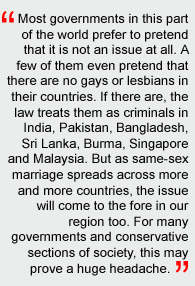This month, Britain begins legalising same-sex marriages through its new Civil Partnership law. Although for political reasons, the government didn't want to call it 'marriage,' in actual fact the law provides exactly the same legal rights and responsibilities as any heterosexually married couple would expect.

Meanwhile, in South Africa, the Constitutional Court has ruled that denying marriage to same-sex couples violates the country's constitution which guarantees equality regardless of sexual orientation. The government has been given a year to amend its laws accordingly, failing which the Court will impose its own interpretation.
This process is similar to what happened in Canada, where the courts had required that, in the name of justice, marriage rights should be extended to same-sex couples, and where finally, a law legalising this came into effect in July 2005.
Other countries that have legalised same-sex marriage are the Netherlands, Belgium and Spain. Furthermore, France, Germany, Portugal and all the Scandinavian countries have laws that provide most marriage rights to "civil unions."
Asia lags behind
What about Asia? Most governments in this part of the world prefer to pretend that it is not an issue at all. A few of them even pretend that there are no gays or lesbians in their countries. If there are, the law treats them as criminals in India, Pakistan, Bangladesh, Sri Lanka, Burma, Singapore and Malaysia.
But as same-sex marriage spreads across more and more countries, the issue will come to the fore in our region too, for cultural ideas, tourism and migration are washing over borders with increasing force. For many governments and conservative sections of society, this may prove a huge headache.
As same-sex marriage becomes part of ordinary life in many countries, it won't be long before TV shows and movies begin to include characters and plots involving it. Already, pop stars such as Elton John and George Michael are expected to tie the knot with their partners in the next month or two, and they will be featured in entertainment news.
Countries such as Singapore that routinely censors gay-friendly programs will be faced with tough decisions.
But more significant may be the flowing of real people across boundaries. Even tourism, despite its short stays, can have a huge impact. For example, hotels and resorts in this part of the world may want to put together honeymoon packages for lesbian and gay couples. Staff and other travel-associated workers will be seeing real-life married couples in quite unfamiliar ways, and are likely to find themselves having to adjust their language when communicating with their clients.
We also have large expatriate communities in many Asian cities, since this region attracts quite a lot of foreign investment. In time, a significant number of expatriate professionals will be married gays and lesbians. Their staff and business contacts will have to get used to them. But more importantly, governments across Asia will have to face the legal issues they present.
For instance, what are our immigration rules when an expatriate wants his legal spouse to come live with him in Singapore, Thailand, Vietnam, China or wherever? Right now, it is quite automatic for Asian governments to grant residency permits to opposite-sex spouses. Will our governments refuse to recognise the status of same-sex spouses? If they don't, will that undercut their efforts to attract foreign investment?
In fact, when one thinks about it, there are no hard and fast rules governing residency permits for opposite-sex spouses, as, even with opposite-sex marriage, the laws are not the same from one country to another. Some countries, for example, recognise and permit polygamy. What happens when a man is posted to a country that does not, yet wants to bring both his wives in?

Popular cartoon series, The Simpsons, featured a same-sex wedding in a 2004 episode. Countries such as Singapore that routinely censors gay-friendly programs will be faced with tough decisions as more TV programs are likely to feature same-sex relationships. More importantly, governments across Asia will have to face the legal issues as same-sex couples apply for residency status in their country.
Eventually, it will become a public issue.
But not everything can be done on the quiet. Sooner or later, courts in Asian countries will be faced with cases stemming from same-sex marriage conducted in other countries.
Imagine that an Asian family has an only son - let's call him Rizal - whom they send to university in Canada. After graduation, Rizal meets and marries someone in Canada, and let's call him Tae-myung. They live together as a couple for over 10 years abroad.
Then Rizal's parents pass away, and he inherits the family properties. But unfortunately, within months, Rizal himself meets with a tragic accident and loses his life.
As his legally married spouse, Tae-myung is Rizal's successor, and the estate should pass to him. But Rizal's uncles and cousins contest Tae-myung's rights in the home country. The court will have to decide the issue, which revolves around whether or not to recognise the marriage legally conducted in Canada. How will it rule?
Most jurisdictions apply the principle of comity when it comes to marital issues. This means that a court will recognise a foreign marriage as valid if it was legal in that foreign country at the time that it was performed. On the face of it, it may seem straightforward to apply the same principle when it comes to same-sex marriage, but the reality may be different. Large sections of the population in this part of the world are still homophobic and unused to the idea of same-sex couples.
Thus, there may be considerable pressure to abandon the principle of comity, and refuse to recognise same-sex marriages conducted abroad.
What this means is that Asian gay and lesbian communities cannot be complacent. We have to do our share of speaking out to educate our societies, and to ensure that courts and governments here do not succumb to their worst instincts.
And we'll be doing our countries a favour too. In striving to keep our countries and laws up to date, we'll be helping to keep them attractive to tourism and investment, and helping to stem the brain drain that so many Asian countries suffer from, as more and more gay and lesbian Asians quit their home cities for more accepting societies in the West.
Hopefully, one day, that brain drain is reversed. Hopefully, one day, there shouldn't be any need for Asians to emigrate when they want to get married.
Alex Au has been a gay activist for over 10 years and is the co-founder of People Like Us. Readers who have experience with applying for Dependent's Passes for their same-sex spouse to live together in Singapore could write to him so that that gay activists in Singapore can have some facts to go on. He can be contacted at yawning@geocities.com.











 Printable Version
Printable Version









